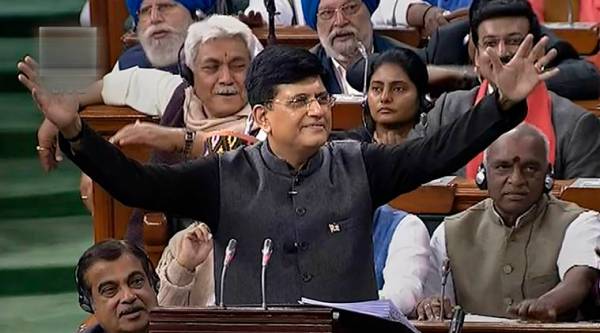
A confident government would have let the Interim Budget be the non-event that it should be, but confidence is one quality that is in short supply in the present BJP-led NDA government. Just look at the lugubrious faces of the BJP members of Parliament, especially those from the states of Rajasthan, Madhya Pradesh, Chhattisgarh and Uttar Pradesh and you will agree with me. So, Prime Minister Modi decided that the occasion of presenting the Interim Budget will be converted into a significant event. The interim finance minister — like a player who has earned his first India cap — tried to convert it into a spectacle. The idea was to inject josh (spirit or enthusiasm) into the government’s swansong. The result, unfortunately, may be very different from what was intended by the Prime Minister and the interim finance minister.
The Brazenness
The promises have begun to unravel.
Let’s look at the Big promise of Rs 6,000 per year, in three instalments, to every farmer owning land of 2 hectares or less under a scheme called PM-KISAN. The government tried to pull the wool over the eyes of the Election Commission (EC) by making the scheme retrospective from December 1, 2018! How is that possible? Will the government credit the first instalment of Rs 2,000 into the farmer’s bank account retrospectively from December 1, 2018, and direct the banks to pay interest from that date? The EC may plead helplessness about the first instalment if it were disbursed before the Election Code kicked in, but, if the EC did not stop the second instalment, the people will conclude that another key institution has been undermined or taken over.
The Bribe
Now, to the merits of the PM-KISAN scheme: every marginal and small farmer — owning land of 2 hectares or less — is covered. That constitutes 86.2 per cent of the total agricultural holdings in the country. While who is covered is important, who is not covered is equally important
* The owner farmer, whether he is a cultivating farmer or an absentee landlord, is covered and will get the money; nThe tenant-farmer is not covered;
* The farm labourer is not covered;
* The non-farm rural poor, like petty shopkeeper, hawker, carpenter, goldsmith, hairdresser etc, are not covered;
* The urban poor are totally excluded.
The owner-farmer’s family, including the absentee landlord’s, will get a grand sum of Rs 17 per day. I am not mocking the scheme; it is the government that is heaping insult on the farmer after inflicting injury on him by raising the prices of diesel, electricity, fertiliser, seeds etc, levying GST on farm equipment like tractors, harvesters and threshers, and denying fair prices for his produce.
Will Rs 17 per family per day alleviate the distress or poverty of a farmer-household? Obviously not. In many states the sum of Rs 500 per month (or Rs 6,000 per year) will be less than the pension for the aged or the disabled or widows. If Rs 17 per day or Rs 2,000 as the first instalment is not a sufficient poverty-alleviating measure, what is it? In plain and simple language, it is cash for votes. The government will give money to the voters on the eve of elections to win their votes — an art perfected by some political parties using ill-gotten money. Under PM-KISAN, government money will be used for the first time to bribe voters.
Do state governments have updated and verified land ownership records? On the one hand, the government wrote to the states on February 4 asking them to update their land ownership records; on the other hand, on the same day, the secretary declared that the first instalment will be disbursed immediately and the government may disburse the second instalment too before the elections. The secretary is supposed to be the keeper of government’s secrets!
The Boast
The other big promise was the pension plan — actually another pension plan after the first one, the Atal Pension Yojana, flopped. The old contributory plan was launched in May 2015 and, until December 2018, could enroll only 1.33 crore subscribers. There were few who could understand the complex matrix of defined contribution that promised a defined benefit as well as return of the corpus contributed by the subscriber. The new plan is seemingly simpler but the contribution of Rs 55 to Rs 100 per month for a very long and presumably unbroken period (31 to 42 years) for an assured pension of Rs 3,000 per month on attaining the age of 60 years does not make economic sense. If the maximum age for enrolment is 50 (as can be inferred from his speech), the interim finance minister knows there will be no payout for 10 years. I suppose with that knowledge and with no hope of enrolling 10 crore labourers and workers as proposed, the interim finance minister set apart only Rs 500 crore! (By the way, apart from paragraph 37 of the Budget speech, where is the allocation mentioned in the Budget documents?)
There were other boasts about Open Defecation Free districts and villages, electricity to every household, free LPG connections, and MUDRA loanees becoming job-creators — notwithstanding the fact that each of these claims has been exposed as untrue by field reports from academics, NGOs and journalists.
Altogether, the Interim Budget revealed that the BJP’s strategy for the Lok Sabha elections is ‘Boast and Bribe the voters’.